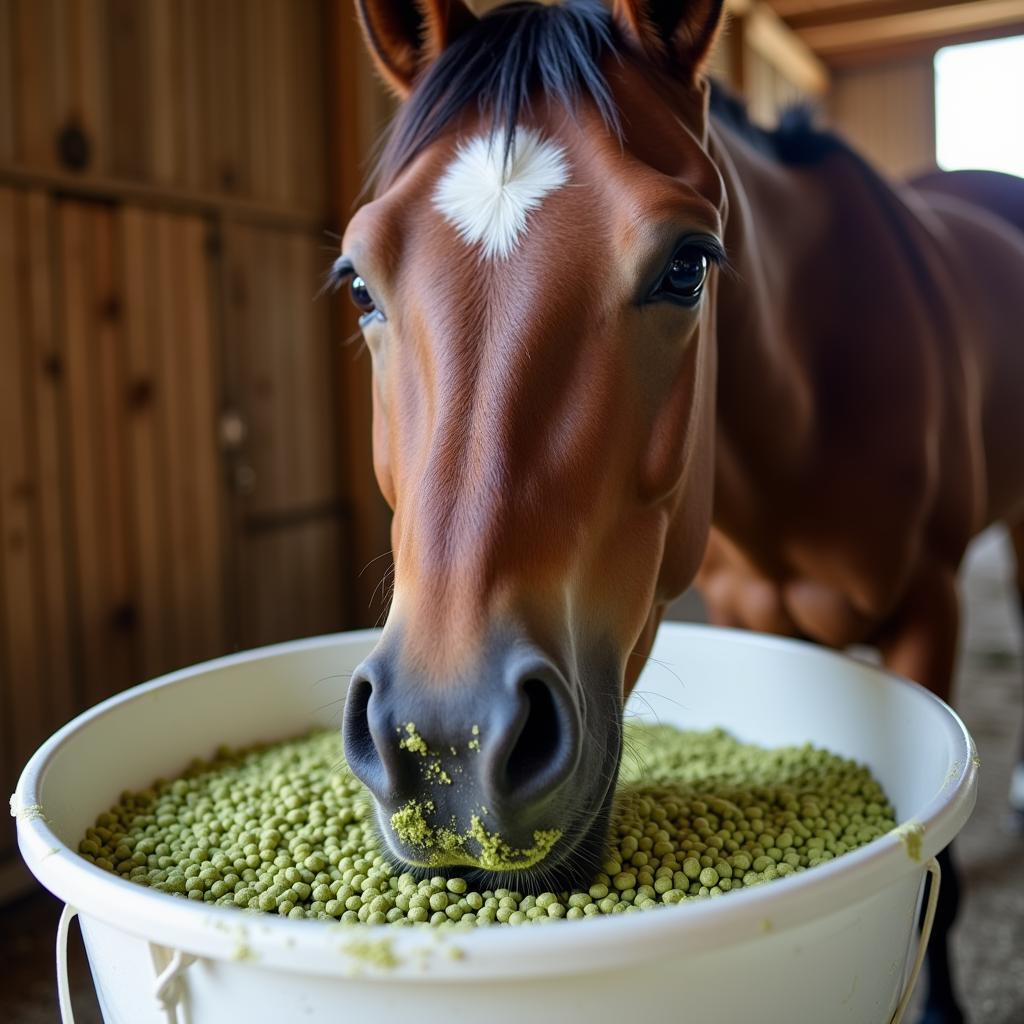Knowing How Much Alfalfa Pellets To Feed A Horse is crucial for maintaining their health and well-being. Feeding the correct amount ensures your horse receives adequate nutrition without risking digestive upset or weight gain. This article will delve into the specifics of alfalfa pellet feeding, offering practical guidance and expert advice. Let’s unravel the complexities of equine nutrition and empower you to provide the best possible care for your horse. alfalfa pellets horse
Understanding Alfalfa Pellets and Their Nutritional Value
Alfalfa pellets are a popular forage choice for horses due to their high protein and calcium content. They offer a convenient and consistent source of nutrition, particularly beneficial for horses with dental issues, picky eaters, or those requiring extra calories. However, the high protein and calcium can be problematic if not fed in appropriate amounts. Overfeeding alfalfa pellets can lead to various health issues, including obesity, colic, and urinary calculi.
 Horse Enjoying Alfalfa Pellets
Horse Enjoying Alfalfa Pellets
Determining the Right Amount of Alfalfa Pellets for Your Horse
The appropriate amount of alfalfa pellets to feed a horse depends on several factors, including the horse’s age, weight, activity level, and overall health. A young, growing horse or a performance horse will require more calories and protein than a mature, sedentary horse. As a general guideline, alfalfa pellets should not exceed 50% of a horse’s total daily forage intake.
Factors Affecting Alfalfa Pellet Intake
- Age: Growing horses have higher nutritional requirements.
- Weight: Larger horses generally need more feed.
- Activity Level: Working horses require more calories than those at rest.
- Overall Health: Horses with specific health conditions may have unique dietary needs.
Calculating Alfalfa Pellet Portions
To accurately determine how much alfalfa pellets to feed your horse, it’s essential to consult with your veterinarian or an equine nutritionist. They can assess your horse’s individual needs and create a tailored feeding plan. A good starting point is to calculate the total daily forage requirement, which should be around 1.5-2% of the horse’s body weight. Then, determine the appropriate proportion of alfalfa pellets based on your horse’s specific circumstances.
Potential Risks of Overfeeding Alfalfa Pellets
- Obesity: Excess calories can lead to weight gain.
- Colic: Overfeeding can disrupt the digestive system.
- Urinary Calculi: High calcium levels can contribute to bladder stones.
Incorporating Alfalfa Pellets into Your Horse’s Diet
Alfalfa pellets can be fed alone or mixed with other forages like grass hay. It’s essential to introduce alfalfa pellets gradually to avoid digestive upset. Always provide fresh, clean water alongside the pellets. Regularly monitor your horse’s weight and adjust the feeding amount as needed. shop horse feed Remember, consistency and moderation are key to successful alfalfa pellet feeding.
“Alfalfa pellets are a valuable tool in equine nutrition, but their benefits are realized only through careful management and understanding,” explains Dr. Emily Carter, DVM, specializing in equine nutrition.
Conclusion
Understanding how much alfalfa pellets to feed a horse is crucial for ensuring optimal health. By carefully considering your horse’s individual needs and following the guidance of a veterinarian or equine nutritionist, you can safely incorporate alfalfa pellets into their diet and provide them with the necessary nutrients for a long and healthy life. mash for horses Don’t hesitate to seek professional advice to create a customized feeding plan for your equine companion.
FAQ
- Can I feed alfalfa pellets to my mini horse? Yes, but in smaller quantities. Check out our mini horse feed for more information.
- Are alfalfa pellets suitable for all horses? While generally safe, some horses may have sensitivities.
- How do I store alfalfa pellets? Store in a cool, dry place to prevent mold growth.
- Can alfalfa pellets replace hay entirely? No, hay should still form the foundation of a horse’s diet.
- What are the signs of alfalfa pellet overfeeding? Signs include weight gain, loose stools, and increased urination.
- Can I mix alfalfa pellets with other feeds? Yes, they can be combined with grains or other supplements as directed by a veterinarian.
- What is the difference between alfalfa pellets and alfalfa cubes? Primarily size and density; cubes are larger and less compressed.
Common Scenarios
Scenario 1: A young, growing horse needs extra protein and calories for development. Alfalfa pellets can be a beneficial supplement, but the amount should be carefully monitored to avoid excess calcium intake.
Scenario 2: An older horse with dental problems struggles to chew hay effectively. Alfalfa pellets offer a palatable and easily digestible alternative, ensuring adequate fiber intake.
Scenario 3: A performance horse requires increased energy for training and competition. Alfalfa pellets can provide a concentrated source of calories, supporting their demanding workload. triple crown naturals pelleted horse feed
Further Reading
Explore our other articles on horse nutrition and feeding practices on our website.
When you need assistance, please contact us: Phone: 0772127271, Email: [email protected] Or visit us at: QGM2+WX2, Vị Trung, Vị Thuỷ, Hậu Giang, Việt Nam. We have a 24/7 customer service team.